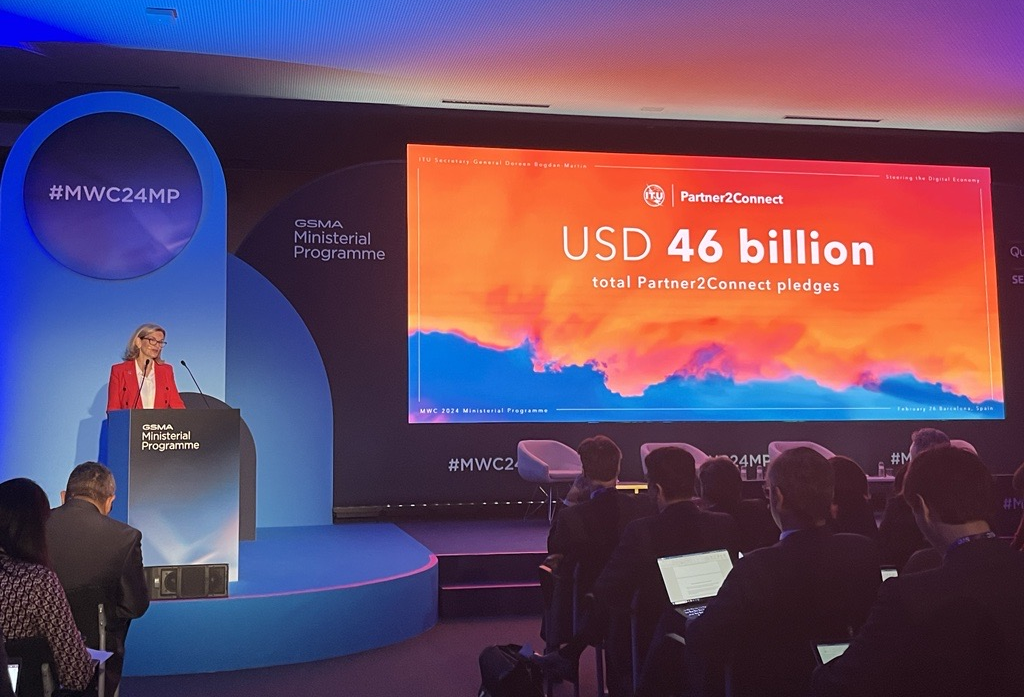
Partner2Connect: Mobile industry answers call for connectivity
ITU News
Fifth generation (5G) mobile telecommunication services could contribute almost USD 1 trillion to the global economy by 2030, becoming a vital component of education, health care, energy distribution, and more.
Mobile services, meanwhile, are intertwined with the booming space economy, itself set to grow to USD 1 trillion by the end of the decade.
Doreen Bogdan-Martin, Secretary-General of the International Telecommunication Union (ITU), has asked mobile telecom leaders to support her push to extend meaningful connectivity to everyone worldwide.
On 26 February, she announced over USD 9 billion worth of new pledges by mobile operator groups through the ITU-led Partner2Connect Digital Coalition.
“Universal, meaningful connectivity is within our grasp,” Bogdan-Martin said. “These commitments will help provide accessible and affordable network connectivity to millions of people in need.”
Associated infrastructure deployments and upgrades “will have a long-term impact on markets and economies across the globe,” she added.
ITU – the UN digital agency – has called on governments and industry to work together to connect every corner of the globe.
Pledges mobilized through Partner2Connect in the last two years now exceed USD 46 billion in value.
The ITU-led connectivity campaign aims to reach USD 100 billion by 2026. The latest pledges from mobile operators bring it close to halfway there.
“Now is the time to redouble our efforts and reach for new heights,” Bogdan-Martin said.
Building backbone
The ITU Secretary-General announced the latest pledges at a key industry event, the opening of the annual Mobile World Congress in Barcelona, Spain.
Telecommunications infrastructure, as the backbone of digital connectivity, is vital to improve education, health and government services, boost trade, and overcome numerous obstacles to development.
The new pledges include:
- USD 6 billion worth of investments by UAE-based e& in accessible, affordable network connectivity and digital services across the Middle East, Africa, and Asia between 2024 and 2026.
- USD 1.4 billion committed by China Telecom for continuously strengthening broadband coverage in remote and border areas of China; social-economic development in South Africa; a 4G/5G network driving digital connectivity in the Philippines; and E-Surfing Cloud services for about 50,000 schools.
- USD 1.1 billion committed by Qatar’s Ooredoo to boost connectivity in developing markets from North Africa to the Indian Ocean.
- Building infrastructure in Ukraine, with VEON committing USD 600 million to provide connectivity and digital services essential to the country’s reconstruction.
The four mobile operators all expect to implement their pledges within five years.
Along with infrastructure, Partner2Connect commitments can support digital skills development and inclusion measures for vulnerable groups.
An estimated 2.6 billion people worldwide still lack Internet access.
Need to close the digital divide
The world’s new era of technological transformation is the fastest yet – heightening risks of leaving inadequately connected people and communities behind.
“It took the telephone 75 years to reach 50 million users. For the radio, it was 38 years; for television 13, and the Internet 4,” observed Bogdan-Martin.
“But it only took two months for ChatGPT to cross the 100 million mark,” she added referring to the generative artificial intelligence (AI) tool that took the world by storm last year.
Four-figure membership
The Secretary-General also announced a growth milestone in ITU’s industry and academia membership.
As of 23 February, those so-called ITU Sector Members reached 1,000, focused on specialized fields alongside ITU’s 193 Member States.
“This collaboration among government, industry, and academia is what’s needed most right now to steer the digital economy through these turbulent times,” Bogdan-Martin said.
Image credit: ITU
